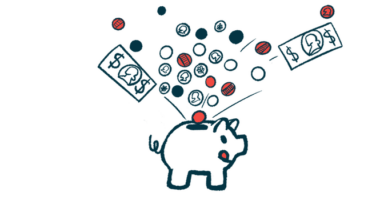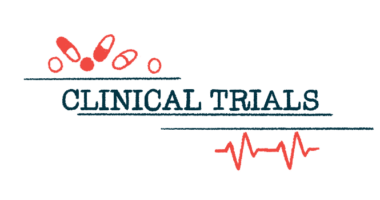CAR T-cell therapy Carvykti OK’d as second-line RRMM treatment
Label expansion request also received positive EMA committee opinion

The U.S. Food and Drug Administration (FDA) has approved the CAR T-cell therapy Carvykti (ciltacabtagene autoleucel) as a second line of treatment for adults with relapsed or refractory multiple myeloma (RRMM).
The therapy was first approved by the FDA in 2022 for adults who received four or more prior lines of treatment, including an immunomodulatory agent (iMiD), a proteasome inhibitor (PI), and a CD38 inhibitor. A label expansion request was submitted in mid-2023.
With this extension approval, which was unanimously supported by an FDA advisory committee, Carvykti is now available for those whose disease is resistant to Revlimid (lenalidomide) and who’ve received at least one line of treatment, including a PI and iMiD.
Co-developed by Janssen and Legend Biotech, the therapy targets BCMA, a protein that’s highly present at the surface of myeloma cells. The approval makes Carvykti the first and only BCMA-targeted treatment approved in the U.S. for multiple myeloma patients as early as a first relapse.
“This milestone underscores our commitment to improve outcomes for patients and transform the treatment of multiple myeloma with Carvykti,” Jordan Schecter, MD, vice president and disease area leader of multiple myeloma at Janssen, now Johnson & Johnson Innovative Medicine, said in a company press release. “We are proud to bring an important, highly effective immunotherapy that has demonstrated a favorable benefit/risk profile to physicians and patients for the earlier treatment of relapsed/refractory multiple myeloma, and we look forward to building on this latest milestone as we continue to focus on our ultimate goal of delivering a cure for multiple myeloma.”
The ‘urgency’ for RRMM patients
The label expansion also received a positive opinion from a European Medicines Agency committee this year. In Europe, Carvykti is available for patients whose disease was resistant to at least three prior lines of treatment, such as a PI, an iMiD, and a CD38 inhibitor.
Now that the therapy will be available to more U.S. patients, the company is increasing its supply.
“We understand the urgency for patients in need of Carvykti, and we have been making considerable progress in increasing supply and availability in anticipation of this milestone approval,” said Tyrone Brewer, president of U.S. hematology at Johnson & Johnson. “We more than doubled manufacturing of Carvykti in 2023, we are striving to double again in 2024, and we will continue to invest in our capacity so we can provide this critical therapy to as many patients as possible.”
What does Carvykti do?
Multiple myeloma is a cancer of plasma cells, a type of immune cell responsible for producing antibodies, that grow out of control in the bone marrow.
As a CAR T-cell therapy, Carvykti enhances the cancer-fighting abilities of immune T-cells. Specifically, T-cells collected from a patient are modified in the lab to carry a chimeric antigen receptor, or CAR, which recognizes and kills cells positive for BCMA. The modified cells are infused back into the patient to kill cancer cells, leaving healthy cells mostly unharmed.
The label expansion was based on data from a Phase 3 clinical trial called CARTITUDE-4 (NCT04181827), which tested Carvykti in 419 adults with myeloma who’d received one to three lines of therapy, including a PI and an IMiD and who were resistant to Revlimid. None had received CAR-T therapy or BCMA-targeted treatment.
The participants were randomly assigned to Carvykti or one of two standard treatment combination regimens.
Nearly 1.5 years after the single infusion, data showed a 59% drop in the risk of disease progression or death for all Carvykti-treated patients and a 65% risk reduction in those who’d received only one prior line of therapy relative to those on standard treatment.
More Carvykti-treated patients achieved a complete treatment response, or had no detectable cancer cells, compared with those given standard regimens.
“CARVYKTI demonstrated remarkable efficacy as a personalized, one-time infusion in the earlier treatment of relapsed/refractory multiple myeloma as shown through the CARTITUDE-4 study results,” said Binod Dhakal, MD, an associate professor at the Medical College of Wisconsin.
About three-quarters of the patients who received Carvykti in CARTITUDE-4 had mild to moderate cytokine release syndrome, a potentially life-threatening inflammatory response associated with CAR T-cell therapies.
Because the treatment may cause potentially life-threatening or fatal side effects, it comes with a boxed warning, the FDA’s highest warning level. Serious side effects include cytokine release syndrome, neurotoxicity, parkinsonism, and Guillain-Barré syndrome. There’s also an increased risk of bleeding, infections, and conditions marked by immune overactivation with Carvykti.
“With this approval, I’m excited for patients who may have the opportunity for a treatment-free period for their multiple myeloma as early as first relapse, with the hope of eliminating the burden of having to be on continuous treatment while living with this challenging disease,” Dhakal said.







